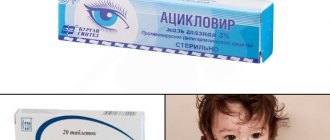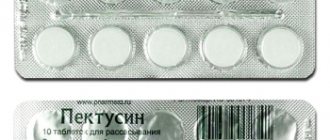Characteristics of Acyclovir
Medicines against viruses are not antibiotics. It destroys viruses, has medium potency, and speeds up recovery. It is advisable for nursing mothers to use Acyclovir ointment, because its penetration into breast milk is minimal. When a doctor prescribes taking a tablet drug, it is strictly forbidden to combine it with alcohol, because alcohol “negates” the effect of Acyclovir.
The drug is effective at the beginning of treatment, in the first days of the disease manifestation. It prevents the spread of infectious lesions of the skin and mucous membranes.
Release forms
The product is available in the form of solutions, ointments for the eyes and skin, creams, powders, and tablets. Eye ointment is prescribed to get rid of stye. It is used no more than 5 times a day. The duration of therapy involves avoiding wearing contact lenses. Skin ointment for breastfeeding is prescribed to get rid of rashes on the lips. Its components are absorbed into the affected areas treated with ointment and spread throughout the body. Their traces are found in residual doses in the urine.
The components of the medicine, when taking the tablets orally, pass into breast milk. Because of this, Acyclovir tablets should be taken with a large volume of liquid (at least a glass), and during the day you should drink more herbal tea, fruit drinks, and compotes. The liquid removes the constituent substances of the medicine and clears the mother's milk of them.
Absorption of the active substance occurs in the intestines, where it is concentrated in maximum quantities a couple of hours after taking the drug.
In severe cases of herpes infection, injections are used, the solution is made from powders, or specially produced hermetically sealed ampoules are used. Injections are not used for breastfeeding, since there is a high probability of the drug components penetrating into the blood, and through it into the milk, in high concentrations.
Compound
The product actively resists viral infection at the cellular level by affecting DNA. As a result, viral cells stop reproducing. This happens thanks to the main component of the drug – acyclovir. It is the main substance and gives the medicine its name.
The drug contains:
- calcium stearate;
- medium molecular weight polyvinylpyrrolidone;
- potato starch;
- aerosil.
The components are simple and do not allow one to doubt the chemical nature of the product, which makes their use possible during breastfeeding.
Package
Manufacturers produce the drug in different packaging:
- tablets - in cellular plates of 10 pieces, in one box - 20 tablets;
- ointments are available in 10 g tubes;
- The lyophilisate is packaged in 250 mg bottles.
The packaging of the drug affects its cost. A box with two strips of tablets and ointment cost about 15 rubles. A solution for injection and drip infusion costs more than 260 rubles. This depends on the pharmacy network, where internal markups are made for the delivery of drugs and the earnings of service personnel, which is reflected in their price.
Acyclovir during breastfeeding: ointment and tablets
11.02.2020 | 2873
Herpes is the most common viral disease, affecting 90% of people. In the absence of stress on the body, the immune system produces antibodies and fights viruses.
If the immune system is damaged, then the appearance of a cold on the lips is inevitable. To treat colds, pharmacies sell many ointments and tablets, often these are broad-spectrum antibiotics, which are contraindicated during lactation.
But for nursing mothers there is a medicine prescribed by doctors.
Breastfeeding mothers are at risk. Even if a woman did not know what herpes was before giving birth, after childbirth more than 95% of new mothers encounter it.
Self-medicating at home is very dangerous during lactation, therefore, when going to the doctor and getting a prescription in hand, the question often arises: “Is it possible to use Acyclovir while breastfeeding? How will the baby react to it, and will breast milk change from taking the medication?”
Release form of the drug
Acyclovir is an antiviral drug that slows down and suppresses the development of the herpes virus in the body. The medicine is not an antibiotic and has 4 release forms (Table 1).
Table 1 – Forms of release of the drug Acyclovir
| Eye ointment | External cream | Pills | Solution for parenteral administration |
| It is used for inflammation of the hair follicle and interciliary space to treat eye diseases and inflammation of the cornea. Helps remove the herpes virus on the lip and intimate area | Used to treat rashes of various etiologies on the skin, lips, and genitals | Dispensed with a doctor's prescription. They act not locally, but throughout the body | Available in powder form. Used for severe viral infection. Most often used for HIV-positive diagnosis |
Acyclovir fights not only against herpetic rashes, it is also used for chickenpox, lichen, herpes zoster, and the Epstein-Barr virus.
Can Acyclovir be used while breastfeeding?
Expectant mothers and women during lactation are allowed to use external Acyclovir ointments on the recommendation of a doctor, but during the period of treatment it is necessary to stop breastfeeding [1].
An ointment that is spread on the skin or mucous membrane does not pose a great danger, since the absorption of the drug into the blood occurs in a minimal dose [2].
Restrictions during lactation
Tablets and injections are strictly prohibited - this is explained by the amount of active substance in one therapeutic dose of the drug. When using parenteral administration of the drug, its concentration in the blood will be enormous, and this entire dose will enter the baby’s body. [3]
The effect of the drug on a child has not been fully studied, so doctors protect children from possible consequences and do not prescribe the administration of drugs using an invasive method.
Features of using ointment during breastfeeding
The effectiveness of the drug has been proven over years of using tablets and ointments against the herpes virus.
For a mother who is breastfeeding, there is no fear that by smearing her lips, she, along with the milk, will transfer enzymes to the baby that help block the virus.
The absorption of medications into the blood through the skin is insignificant, and the dosage of the active substance in the blood will be half that allowed for children under one year of age.
Is it possible to breastfeed if you have herpes?
You should not stop breastfeeding while the wound from herpes is healing or during treatment with ointment. The child must receive antibodies from the mother that fight the virus. Feeding during such illnesses only strengthens the baby.
Important : the only exception is herpes on the nipples or areolas (skin around the nipple). If a rash appears on one breast, you can give the baby the other, and only express milk from the infected one. An important point in this case is to prevent the child from touching the rash with his hands, much less his lips. [5]
Prevention of herpes in a child
It has been scientifically proven that a mother who feeds her baby during a cold passes on antibodies to him along with breast milk. You just have to be careful when communicating with your baby:
- It is better to wear a protective mask, since the herpes virus is transmitted not only by contact, but also by airborne droplets;
- If you have a rash on your lips, you should not kiss your child.
Side effects of Acyclovir
When applying the ointment, itching, burning, and rash may occur.
when using eye ointment .
For invasive therapy:
- renal colic, the appearance of urea nitrogen;
- violation of the ratio of blood plasma and its components (hematuria);
- psychosis, dizziness, drowsiness. disruption of the nervous system;
- nausea, vomiting, stool disorders;
- Quincke's edema and other anaphylactic reactions;
- liver dysfunction;
- inflammation at the site of IV administration.
Bibliography:
Source: https://KormiGrudyu.ru/atsiklovir-pri-grudnom-vskarmlivanii-maz-i-tabletki
When is it prescribed?
If a woman is on breastfeeding, she is prescribed Acyclovir not only to treat an already outbreak infection, but also to prevent frequently occurring herpes diseases.
The main reasons for prescribing the drug:
- treatment of chickenpox, lichen, keratitis;
- support of the body after transplantation interventions;
- with HIV.
The dosage is selected by the doctor based on the patient’s condition and the form of infection in the body. Standard dosage tablets (200 milligrams) are taken strictly after meals, 2-3 times a day. When the mother herself gets chickenpox, the medication intake is increased to 4 times a day, in total the daily dose should not exceed 800 milligrams, treatment must be carried out for 5 days, regardless of the disappearance of external manifestations of the rash.
Side effects and contraindications
Any drug, regardless of what period of life, a woman takes it, has contraindications, Acyclovir is no exception. You cannot use the product if:
- the nursing mother is allergic to the components of the drug,
- kidneys are susceptible to diseases, the use of tablets and intravenous injections is especially prohibited, which leads to kidney failure,
- there is individual intolerance or hypersensitivity to the ingredients of Acyclovir,
- the patient has neurological disorders,
- infected child under two years of age.
In addition to obvious contraindications, the drug has a number of side effects, which include:
- nausea,
- headache,
- convulsions,
- anemia,
- blurred vision,
- conjunctivitis,
- drowsiness and this is only part of them.
Any form of the drug should be used only after consultation with a doctor, analyzing the patient’s existing chronic diseases and the compatibility of Acyclovir with other drugs.
Use during lactation
When herpes rashes affect breast tissue, you must adhere to the following rules:
- the pediatrician will prescribe the medicine most suitable for the infant;
- prevent the child from touching the rashes on the mother’s skin; they are bandaged and covered with medical napkins;
- If there is a rash on both mammary glands, breastfeeding should be temporarily avoided in order to quickly cure the infection.
Breast milk concentrates 1% of the medicine from the dose that a nursing woman drinks. When the medicine is taken internally 5 times, a small percentage of the active substance gets into the milk, and the child gets a negligible amount of the drug.
The medicine is removed from a woman’s body in 3 hours. With such an elimination interval, the use of Acyclovir is very convenient: the mother takes a pill immediately after feeding, drinks a large volume of liquid, and by the next feeding the baby receives pure, high-quality breast milk, without medication residues.
Hygiene measures are important if the mother is treating herpes while feeding the baby, so as not to pass the infection to the child. If this happens, the doctor begins treatment of the baby with the same Acyclovir, calculating the dosage based on the child’s weight.
Precautionary measures
Acyclovir causes side effects, which is why for hepatitis B it is used exclusively on the recommendation of a pediatrician.
Injections are given carefully to persons suffering from neurological dysfunctions and impaired renal function. The drug has a negative effect on the central nervous system, especially when immunity is low and the dosage is exceeded. When applying the ointment, you need to make sure that it does not get on the mucous membranes of the eyes and mouth.
In the accompanying instructions, manufacturers indicate that Acyclovir is not recommended during breastfeeding, but, citing the International Directory of e-lactancia, doctors still prescribe it to nursing women.
Herpes is unpleasant due to its long incubation period, when viruses live in the body, but do not manifest themselves until a certain level of decreased immunity. The period of pregnancy, childbirth, and the postpartum period are dangerous periods of decreased immunity and increased viral activity. Here the drug is prescribed and taken only under the supervision of a doctor, who warns about caution when taking the drug and the importance of monitoring your well-being and the condition of the baby.
Acyclovir during breastfeeding: benefit or harm?
A wide variety of viruses attack the human body every day: infections can affect any organs and cause inflammatory or allergic reactions.
People suffering from immunodeficiency are especially susceptible to attack by viruses: the older generation, children of preschool and school age, pregnant and lactating women.
A nursing mother is especially concerned about her well-being, since the baby’s health depends on it. What to do if a woman gets sick with the herpes virus, and the doctor prescribed treatment with Acyclovir during lactation? What kind of drug is this? How safe is it for a child? The answers to these and other questions are presented in the article.
Characteristics of the drug
Acyclovir is a selective antiviral agent.
The active component of the same name suppresses the proliferation of pathogenic viruses that cause herpes, chickenpox, herpes zoster, cytomegalovirus and HIV infection.
Clinical signs of taking the drug are expressed by the localization of a herpetic rash on the skin without further spread, healing of skin rashes at the vesicular stage, and a decrease in pain and itching syndromes.
The medicine also has a preventive effect aimed at treating internal herpes. It is also prescribed as an immuno-strengthening agent. The therapeutic effect of the drug is considered weak, but quite effective.
Dosage forms on pharmacy shelves include ointment, cream, tablets and powder for preparing a solution.
Acyclovir 3% ointment is used to treat keratitis and other eye pathologies caused by the herpes virus. Acyclovir 5% cream is intended to suppress skin diseases caused by these viruses.
Based on the powder form, a solution for intravenous injection is made.
Injections or tablets are prescribed for severe stages of disease, and also as an immunostimulant in cases of reduced functioning of the immune system.
Use of medication during lactation
According to the instructions for use, the drug is contraindicated for women during breastfeeding. This is due to the fact that studies on the effect of the drug on children under one year of age have not yet been conducted. However, the aforementioned Acyclovir for breastfeeding is still prescribed during lactation in any dosage form, with the exception of injections.
The fact is that taking one Acyclovir tablet (the amount of the active substance is 200 mg) creates a concentration in breast milk that does not exceed 0.2 g. This amount is negligible and will not cause any harm if it enters the child’s body. When using an ointment or cream, the concentration is even lower, since the main indicators are concentrated on the mucous membranes and skin.
The medicine does not accumulate in the body and is completely eliminated from it after 2.8-3 hours. An increase in the content of the active component in breast milk is only possible when using large doses. But doctors rarely prescribe such therapy.
In addition, you need to take into account the fact that when taking Acyclovir while breastfeeding, side effects may occur that negatively affect the well-being of the young mother. These include:
- nausea, vomiting;
- painful cramps in the abdominal area;
- intestinal disorders;
- dizziness, sleep disturbances;
- allergic reactions, skin irritations;
- burning in the eye area.
The drug can be used only as prescribed by a doctor and should not exceed the indicated daily dose. Then most side effects can be avoided.
Side effects
When choosing a remedy to get rid of herpes, the doctor is based on the individual condition of each woman. It will take both external and internal influence on viral agents to quickly deal with them. Acyclovir is a safe and effective medicine suitable for nursing mothers.
The drug will have side effects if the dosage is greatly exceeded, if there is a history of central nervous system diseases or impaired renal function. This medicine is not prescribed to nursing mothers in tablets, injections, or droppers.
The tablets cause:
- allergies;
- nausea, vomiting;
- diarrhea;
- widespread pain throughout the abdomen;
- headaches.
Itching and dry skin with peeling may occur. Upon contact with mucous membranes, inflammation, blepharitis, and keratitis form in the eyes.
Description of the medication
Acyclovir is a popular antiviral drug that is used to treat herpes virus infection. Thanks to the action of the components, herpes viruses stop developing, as a result of which the body copes with the infection.
The main active ingredient is acyclovir. There are 4 dosage forms of the drug:
- eye ointment;
- skin cream;
- pills;
- powder for injections.
This medication is used to treat herpes infections of any type and location.
Treatment of herpes in a nursing mother with Acyclovir is possible only after a doctor's prescription.
Overdose
Taking an extra pill will not bring improvement; rather, it will cause symptoms of overdose, which is expressed in:
- anemia;
- visual impairment;
- swelling;
- muscle pain.
Symptoms of inflammation on the skin intensify, and irritation appears in the eyes.
When taking more than 5 grams of Acyclovir internally, doctors check kidney function and remove excess drug by hemodialysis. When a doctor prescribes a single intravenous injection of 80 milligrams of the drug, this is not considered an overdose.
An excessive dose of the drug causes kidney failure, dehydration, skin rash, and diarrhea.
Drug interactions
The simultaneous use of Acyclovir with other immunostimulants enhances their mutual therapeutic effect. At the same time, simultaneous use of the drug with antibiotics, tetracyclines, and cephalosporins is not recommended. This combination increases the risk of complications in the functions of the urinary organs.
The use of Acyclovir with Probenecid significantly increases the average T1/2 and reduces the clearance of the active component - acyclovir. Combination of administration with drugs of the nephrotoxic group increases the risk of dysfunction of the renal system.
How does breastfeeding affect milk and the baby?
The standard dose of one tablet is 200 milligrams. A simple calculation shows that during mother’s treatment with tablets, no more than 0.3 milligrams of the active substance gets into the milk. This is considered by doctors to be such a small amount that it does not have a negative effect on the baby.
To achieve even less penetration of the active substance into breast milk, the mother needs to increase the volume of liquid she drinks so that the remaining drug is removed from her body in a timely manner. This time is 3 hours. Considering that the break between feedings of the child is also 3 hours, and the mother changes the breast given to the baby at each feeding, the correct recommendation from doctors will work perfectly - to drink medicine after feeding.
In addition, during breastfeeding, the mother’s body actively produces antiviral antibodies that neutralize viruses; Antibodies from the mother's milk are transferred to the baby, and the child's immunity is strengthened.
Recommendations for use in breastfeeding mothers
Acyclovir is eliminated from the body after a short amount of time (3 hours). Therefore, pediatricians advise young mothers to take tablets between feedings of the baby, taking a three-hour break between them. Standard treatment involves taking Acyclovir up to 5 times a day.
When treating skin diseases, the application of medicinal ointment should also occur no more than five times a day. It is necessary to adhere to preventive actions to avoid infection of the baby. To do this, you should exclude the baby from contact with the affected areas and regularly wash your hands with soap.
If the virus has infected the chest, the inflamed areas can be treated with Fukortsin or propolis tincture, and then bandage the area. This will also help prevent the pathogen from spreading to the baby. If a rash develops on one breast, it is necessary to express milk from it and feed the baby with the other. These actions will help maintain lactation.
Important! When the virus spreads, breastfeeding should be stopped to protect the baby from infection.
Similar means
Analogues of Acyclovir are:
- Viropex;
- Zovirax;
- Valtrex;
- Lisavir;
- Gerpevir;
- Fenistil;
- Herpferon;
- Cyclovir;
- Vivorax;
- Fukortsin.
Each of the remedies has its positive and negative sides, and their use by nursing mothers should only occur with the approval of a pediatrician.










